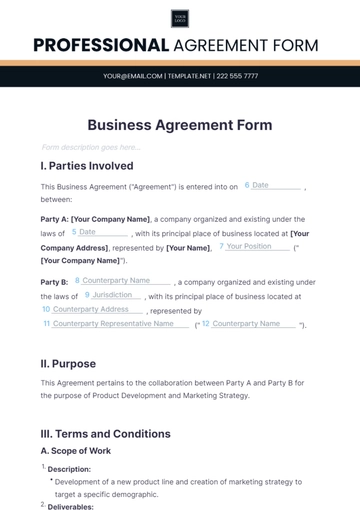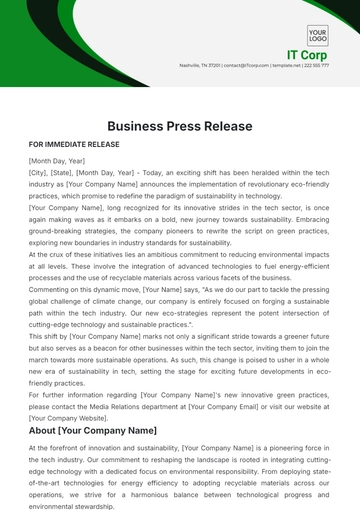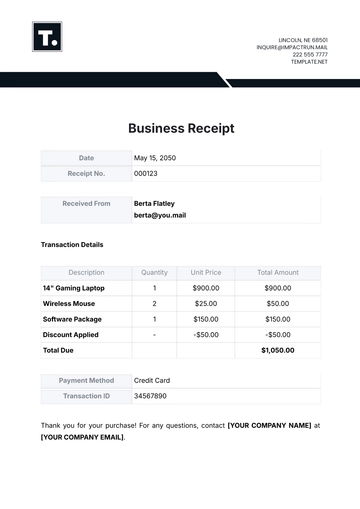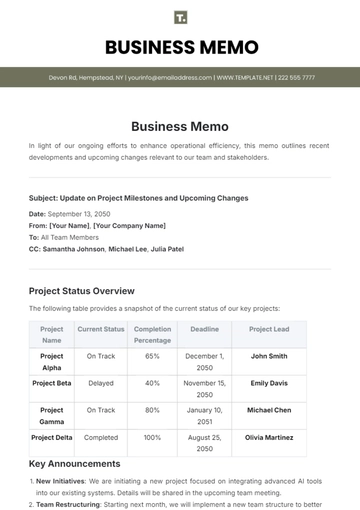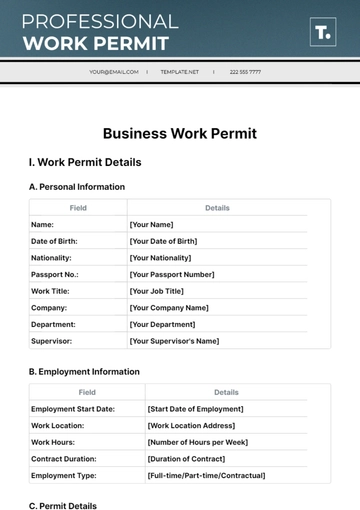Free Business Management

I. Introduction
This Business Management document serves as a comprehensive guide for all managerial practices within [Your Company Name], outlining the key objectives and procedures to ensure smooth and efficient operations. The framework detailed herein will help to create a structured environment where all managerial activities contribute to the overall success of the organization. By adhering to this policy, [Your Company Name] aims to promote productivity, optimize resource use, and ensure that every decision made aligns with our broader business goals. Additionally, this document provides the necessary guidelines to streamline operations across departments, enhancing communication and collaboration.
At [Your Company Name], our management approach is grounded in principles of accountability, transparency, and performance optimization. Every manager, team leader, and employee is expected to follow these policies to foster a culture of consistency, professionalism, and innovation. By leveraging these policies, we will not only meet compliance standards but also continuously evolve in response to market changes, customer demands, and technological advancements. This Business Management document will serve as a roadmap to strengthen operational efficiency and drive long-term organizational growth, ensuring that [Your Company Name] remains competitive in the ever-changing business landscape.
II. Objectives
The primary objectives of this Business Management Policy are as follows:
Ensure consistency and continuity in business operations.
Enhance organizational efficiency and effectiveness.
Promote accountability and responsibility across all levels of management.
Facilitate strategic planning and decision-making processes.
III. Scope
This policy applies to all employees of [Your Company Name], with a particular focus on those in management or supervisory roles. It encompasses all aspects of business management, including planning, organizing, leading, and controlling resources. The policy ensures that every manager and employee contributes to the effective operation of the organization, aligning their efforts with company objectives. By following these guidelines, [Your Company Name] ensures consistency in management practices, promoting operational efficiency and compliance with legal standards.
IV. Management Responsibilities
All managers at [Your Company Name] play a critical role in ensuring the success and sustainability of the organization. Their responsibilities go beyond task delegation and oversight, requiring a proactive approach to leadership, strategic decision-making, and team development. Managers are expected to:
Set Clear, Achievable Objectives: Establish well-defined, measurable goals for their teams that align with overall business objectives. These goals should be communicated effectively to ensure everyone understands their role in achieving success.
Foster a Positive and Productive Work Environment: Cultivate a culture of trust, respect, and collaboration, where team members feel supported and empowered to perform at their best. Managers should lead by example, promoting open communication and addressing conflicts promptly.
Regularly Evaluate Team Performance: Conduct consistent performance assessments, offering constructive feedback to team members. These evaluations should be used to identify strengths, areas for improvement, and opportunities for professional development. Managers should also recognize and reward outstanding performance to motivate and retain top talent.
Make Informed and Timely Decisions: Utilize data, industry trends, and input from team members to make strategic decisions that drive business growth and operational efficiency. Managers must be decisive, balancing short-term needs with long-term objectives.
Ensure Compliance with Laws and Ethical Standards: Uphold all legal, regulatory, and ethical standards in every aspect of business operations. Managers must ensure that their teams follow company policies, meet regulatory requirements, and maintain the highest levels of integrity in every action.
V. Strategic Planning
Strategic planning at [Your Company Name] is essential for achieving our business objectives and ensuring long-term sustainability. This process involves a forward-thinking approach, designed to anticipate changes in the market and position the company for continued success. To drive growth and maintain a competitive edge, our strategic planning efforts will include:
Conducting Regular Assessments of the Business Environment: Periodically analyze internal and external factors that impact the business, such as market trends, economic conditions, technological advancements, and competitive dynamics. These assessments help to identify risks and opportunities that may influence strategic decisions.
Identifying Opportunities for Growth and Improvement: Evaluate potential areas where the company can expand its market presence, improve operational efficiency, or enhance product/service offerings. This includes exploring new markets, partnerships, innovations, and customer needs to position [Your Company Name] for continued growth.
Developing Long-Term and Short-Term Plans: Formulate both long-term (3-5 year) and short-term (annual) business plans that are aligned with the company's overarching goals. These plans will provide a roadmap for the organization, ensuring that every department's objectives contribute to the broader vision of success.
Allocating Resources Effectively: Ensure the strategic allocation of resources, including finances, personnel, and technology, to support the execution of key initiatives. Proper resource management is critical for achieving milestones, minimizing waste, and optimizing returns on investment.
VI. Performance Monitoring and Evaluation
Performance monitoring and evaluation will be conducted to ensure the effectiveness of managerial activities:
Regular review of key performance indicators (KPIs).
Implementation of performance appraisal systems.
Continuous feedback loops to improve processes and outcomes.
Holding management accountable for their decisions and actions.
VII. Implementation and Review
The successful execution of this Business Management Policy at [Your Company Name] requires effective communication and regular evaluation. Upon finalization, this policy will be shared with all relevant parties, including management, supervisors, and employees, to ensure a clear understanding of their roles and responsibilities. Managers are tasked with ensuring that every team member is aware of the guidelines and procedures outlined in this document, fostering a unified approach to achieving business objectives.
This policy is not static; it will undergo regular reviews to maintain its relevance and effectiveness in light of changing business needs, market conditions, and regulatory requirements. These reviews will take place annually or as necessary when significant internal or external changes arise. Any amendments or updates will be carefully documented and communicated promptly to ensure that all employees are aligned with the current version of the policy.
By adhering to the guidelines and principles set forth in this Business Management Policy, [Your Company Name] commits to fostering a culture of continuous improvement, operational excellence, and accountability. This approach will not only help us achieve our organizational goals but will also enable us to deliver exceptional value to our stakeholders, clients, and employees. Regular review and adaptation will ensure that our management practices evolve with the business, ensuring long-term success and sustainability.
- 100% Customizable, free editor
- Access 1 Million+ Templates, photo’s & graphics
- Download or share as a template
- Click and replace photos, graphics, text, backgrounds
- Resize, crop, AI write & more
- Access advanced editor
Enhance your organizational effectiveness with the Business Management Template from Template.net. This editable and customizable document provides a structured framework for outlining management strategies, team roles, and performance metrics. Fully editable in our Ai Editor Tool, it allows you to tailor the template to fit your business's specific management needs, fostering clarity and accountability within your team.
You may also like
- Academic
- Accounting
- Administration
- Advertising
- Affiliate Marketing
- Agency
- Agriculture
- Airline
- Architecture
- Attorney
- Auction
- Auto Repair Service
- Aviation
- Baby Sitting
- Bank
- Barber Shop
- Beauty Parlor
- Board of Director
- Bookkeeping
- Boutique
- Brand
- Camping
- Car Rental
- Catering
- CEO
- Chef
- Child Care
- Chiropractic Clinic
- Church
- Cleaning Service
- Climate Change
- Coaching
- College
- Conference
- Construction
- Consultant
- Contractor
- Corporate
- Cricket
- Cryptocurrency
- Day Care
- Defense
- Dental Clinic
- Digital Marketing Agency
- Director
- Donation
- Driving School
- E-commerce
- Education
- Electrician
- Electronic Company
- Engineering Company
- Entertainment
- Entrepreneur
- Event
- Facilities Management
- Factory
- Fashion Designer
- Film
- Finance
- Flower Shop
- Football
- Freelancer
- Front Office
- Furniture Store
- Gaming
- Health & Safety
- Healthcare
- Hiring
- Home Care
- Hospital
- Hostel
- Hosting
- Hotel
- HR
- Ice Cream Parlor
- Industry
- Influencer
- Insurance Agency
- Interior Design
- Investment
- Investor
- IT Services and Consulting
- Kindergarten
- Landlord
- Landscaping
- Law Firm
- Lawn Care
- Lawyer
- Leadership
- Legal
- Logistics Company
- Manufacturing
- Marketing
- Media
- Movie Theater
- Moving Company
- Music Band
- Music Festival
- Nail Salon
- Night Club
- Non Profit
- Nurse
- Nursery
- Nursing Home
- Operation
- Pet Care
- Pet Grooming
- Pet Store
- Pharmaceutical
- Pharmacy
- Photographer
- Plumbing
- Police
- Process
- Property Management
- Psychologist
- Quality Control
- Real Estate
- Restaurant
- Retail
- Sales
- Salon
- School
- SEO
- Shipping Company
- Skin Beauty Clinic
- Small Business
- Speaker
- Staffing Agency
- Startup
- Team
- Therapist
- Tourism
- Trade Show
- Transport and Logistics
- Travel Agency
- Tutor
- University
- Venture Capital
- Wedding
- Work




